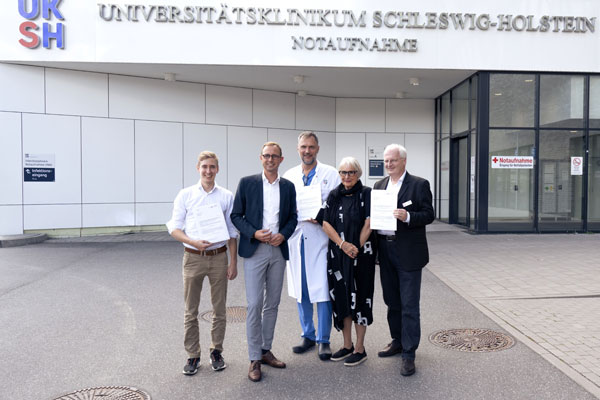The use of emergency rooms and the risk of inadequate patient care that fails to meet medical requirements is the subject of intense debate among experts. In addition, less than optimal use of resources leads to longer waiting times, which in turn can lead to dissatisfaction among patients and staff.
In order to meet this challenge, the State is financing the joint project “Assistance System for Optimizing Operations in the Emergency Room – APONA” in UKSH with a total amount of €563,800. The research project is a merger between UKSH, the German Research Center for Artificial Intelligence (DFKI) and singularIT GmbH. The main objective of the joint venture is to use artificial intelligence to improve operations in the emergency room in terms of human, spatial and technical resources. People who come to the emergency room usually have serious health concerns. “If it is not clear after that how long the stay will last or what steps will be taken after that, it means an additional burden not only for the patients, but also for the medical staff,” said Dirk Schroeter, Minister for Digitization. “The APONA AI project makes a significant contribution to improving operations in the emergency room and shows how AI has a direct and positive impact on people. In addition, the joint project once again highlights Lübeck as a beacon for AI in the medical field and shows how many small businesses can And the medium in the state will also benefit from future technology and artificial intelligence funding.”
The benefits of APONA support are tested on the Lübeck campus to assess applicability and effectiveness.
“As the number of patients in emergency rooms increases, so does the need for a modern, intelligent system that is state-of-the-art in research, optimizes operations and focuses healthcare. The Lübeck campus is exactly the right place to combine clinical and technical knowledge in order to improve emergency care here and in other clinics. said Prof. Dr. Gabriele Gillessen-Kaesbach, Rector of the University of Lübeck.
Dr. Sebastian Wolfrum, Head of the Multidisciplinary Emergency Room at UKSH, University of Lübeck Campus, said: “The classic process of diagnosing and treating an emergency consists of various individual steps, delaying which can prolong the patient’s stay. APONA is an innovative analysis and forecasting system that checks emergency department data “These algorithms are then retrospectively tested to identify relevant algorithms with predictive value. These algorithms are then tested on more recent datasets to verify their accuracy and effectiveness.”
Mr. Dr. Ralf Müller, Scientific Director of the Stochastic Relational AI Research Area in Healthcare at DFKI and Director of the Institute for Information Systems at the University of Lübeck adds: “An important step is the use of APONA in a future approach in real time in the emergency room in order to support process optimization. This means that The system is actively used during the ED treatment workflow to assist in decision making and resource accounting.”
Preliminary results from preparatory research have already been presented in conferences and first publications. The widespread interest indicates that other clinics and the healthcare system as a whole could also benefit from the results obtained with APONA.” Matthijs Hartwig, Managing Director of singularIT GmbH.
In addition to the main application, there are other possible applications where APONA can provide support:
Determine which patients require an inpatient treatment bed based on factors such as disease severity and resource availability
Predicting the expected length of stay of the patient on the treatment bed in order to improve the bed occupancy
Individual determination of the optimal diagnostic and therapeutic methods, taking into account factors such as medical history and current symptoms
Anticipating diagnostic procedures that are likely to result in negative results to avoid costly or unnecessary testing
The requested data is processed anonymously by UKSH and analyzed with project partners. Based on the data provided, DFKI develops, trains and evaluates prediction models. These models are then included in the software developed by singularIT. In addition, singularIT creates the architecture of continuous learning and use of models and software.
Digitalization Minister Dirk Schröder (second from left) hands a state funding decision of €563,800 to Amnesty International’s joint APONA project. Photo: UKSH
Text number: 160690 Author: UKSH / red. From 08/21/2023 at 5:59 PM

“Certified tv guru. Reader. Professional writer. Avid introvert. Extreme pop culture buff.”






More Stories
AI-powered traffic lights are now being tested in this city in Baden-Württemberg.
The use of artificial intelligence in companies has quadrupled
AI Startup: Here Are Eight Startup Ideas